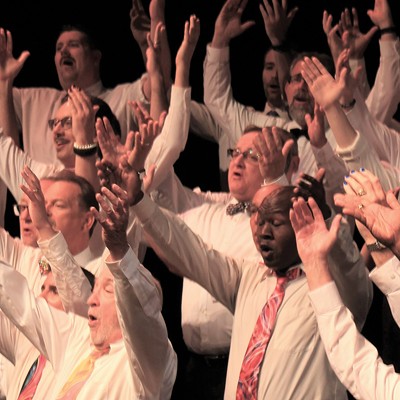I was bored. It pains me to say it, but that's the truth.
Arizona Repertory Theatre has chosen to kick off the new season with The Voice of the Prairie, by John Olive. It's an odd choice, because it's an anemic story about the vitality of storytelling.
The University of Arizona's School of Theatre, Film and Television—a fairly recent merger of programs—offers its students opportunities which challenge and nurture their skills, and for some, allow them a chance to explore their commitment to theater as a profession. The Arizona Repertory Theatre gives them a full-scale classroom, allowing them to experience what it's like to produce a quality theater experience in all its complexity. At the same time, ART provides our community with an opportunity to enjoy often-excellent theater, including some rarely presented works.
Director Brent Gibbs and his company do a very good job of combining all of the elements that a professional-quality show requires, but the play itself just doesn't have enough juice to energize our minds and engage our hearts.
Flowing back and forth in time, The Voice of the Prairie tells the tale of homeless Davey (Matt Cordon), and blind, abused Frankie (Heather Cox), who meet as youngsters. After Frankie's mother dies, her father wants to put her in a home, but Frankie despises the idea, and after finding Davey in the family's hayloft, they conspire to run away together. But running away does not necessarily mean running to something, and since Frankie has landed on the newspapers' front pages as a missing person, their adventures largely consist of trying to avoid capture.
This story is told in short scenes which are woven within the story of adult Davey (James Conway), who has grown into a loosely put-together man with a gift for storytelling. His father, Poppy (Aaron Blanco), as we know him, was quite a master teller of tales—lies as well as stories. Davey, having been brought up as his father's audience, seems to have inherited the knack. This is the time when radio was just establishing its foothold in the Midwest, and New York entrepreneur Leon Schwab (Max Nussbaum) recognizes Davey's skills, hiring him to tell his stories—many of which center on his life as a "kid hobo" with Frankie—on the air. Radio waves reach far and fast, and steady listeners become fans who wish for him to be reunited with Frankie (now known as Frances).
The outcome? Let's just say that stories—and the radio waves which broadcast them—are pretty powerful things.
There is certainly a sweetness and poignancy about these characters, and the cast does a sound job of communicating these qualities. Since this sweetness is the chief emotional characteristic of the piece, it would be easy for the story to become cloying, but Olive, Gibbs and company steer clear of that potential trap.
The trouble is, there's just not enough emotional depth to propel the action and encourage our investment in these characters. There's Schwab, who gives us some comic energy to help drive the story along, but he seems to be more device than character. Olive's story is just too disjointed, and he has scrambled to patch it together with the playwriting equivalent of duct tape. However, the seams are quite obvious. We see Poppy in the first scene, in which he rambles off a tale while panhandling for coins with which he can buy a drink. Then he disappears until the play's final moments. Again, his character feels more like a device than a real person.
The flowing back and forth in time, while certainly a familiar convention, heightens Olive's patchwork approach, even though the cast and crew carry out these shifts fluidly. The scenes just don't give us much to hang on to; we like these folks and wish them well, but they don't take root in our hearts. Instead, these sketchy scenes, rather than grounding us emotionally, seem to float in an ethereal arena, much like the ether through which radio waves carry Davey's memories. His stories, although informal, have a charm and a fundamental focus, but a play can't replicate the free-form looseness of a radio storyteller without losing its dramatic punch. Olive's focus is never quite sharp enough for his story to hook us and reel us in.
Another stumbling block involves the trio of actors who pop in several times, ostensibly to relay pertinent information, but who also appear to be a device to cover set changes, with which they assist. It doesn't help that one can't really hear what they are saying, since they are overpowered by music.
The result is a rather bland—and boring—experience.
The central characters are well-shaped by the young actors. Cox and Sarah Baron (who plays adult Frances) endow Frankie with charm and spunk, and Cordon and Conway create a sweet and guileless Davey. Nussbaum gives an energetic, though slightly cartoonish reading of Schwab. Jacklyn Fitzgerald's set is attractive and shifts to suggest various locales with little distraction. Deanna Fitzgerald's lighting design is very impressive, and Nicole Valencia's costumes suggest period and class effectively.
In fact, there are many positives about the efforts of those involved in ART's production. But in the end, those efforts, although enthusiastic, are offered in the service of a less-than-stellar play.








